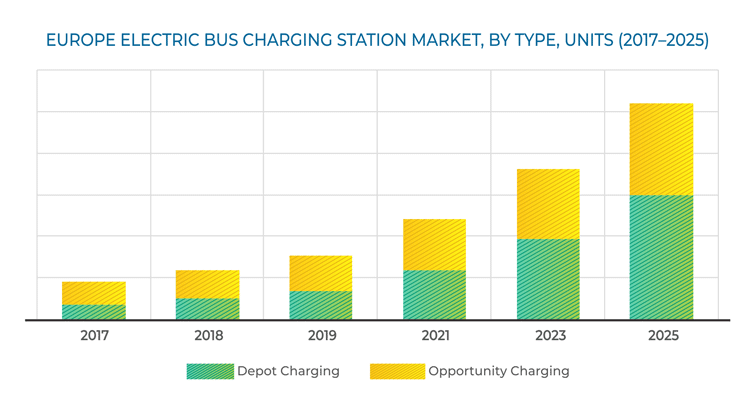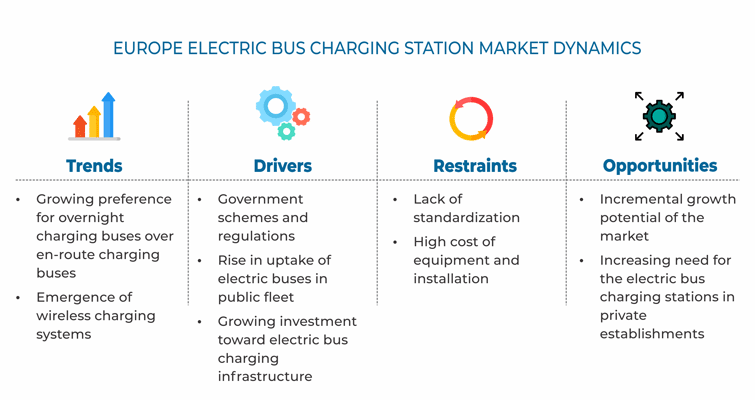Report Code: 11571 | Available Format: PDF | Pages: 110
Europe Electric Bus Charging Station Market Research Report: By Type (Depot Charging, Opportunity Charging), Power (<50 kW, 50-150 kW, 150-450 kW, >450 kW), Charger (Off-Board, On-Board), Regional Insight (U.K., Germany, Netherlands, Lithuania, Austria, Belgium, Poland, Sweden, Spain, France) - Competitive Analysis and Industry Forecast to 2025
- Report Code: 11571
- Available Format: PDF
- Pages: 110
- Report Description
- Table of Contents
- Market Segmentation
- Request Free Sample
Europe Electric Bus Charging Station Market Overview
The European electric bus charging station market stood at $221.2 million in 2018. The market is expected to grow at a CAGR of 22.4%, in terms of volume, during the forecast period. The major factors driving the growth of the market are availability of government schemes and regulations, rise in uptake of electric buses in public fleet, and increasing investment toward electric bus charging infrastructure.

On the basis of charger, the European electric bus charging station market is categorized into off-board and on-board chargers. Out of the two, the off-board charger was larger category, in terms of volume, in 2018. Additionally, it is expected to remain the dominant category during the forecast period. Off-board station allows bus makers to curb down the weight of the vehicle and makes the bus lighter, which allows rapid charging at higher power levels. Additionally, it is also preferred due to its vehicle-to-grid reactive power capability.
On the basis of type, the European electric bus charging station market is classified into depot charging, opportunity charging, and others. Among these, the opportunity charging category held the largest market share in terms of sales volume, in 2018. However, during the forecast period, the depot charging category is expected to witness the fastest growth, owing to the growing preference of public and private agencies toward overnight charging buses, as they have more similar operational characteristics to a diesel bus.
Geographically, the European electric bus charging station market is categorized on the basis of country into the U.K., Germany, the Netherlands, Lithuania, Austria, Belgium, Poland, Sweden, Spain, and France. Among these, the U.K. held the largest market share in the region during the historical period, in terms of volume. This is due to the fact that the U.K. is intensively focusing on establishing a green mobility solution, thereby accelerating the electrification of its public transit fleets. Additionally, faster adoption rate of electric vehicles in the country, supported by the government in form of financial and non-financial incentives for the procurement of these vehicles as well as developing related infrastructure are other factors driving the growth of the U.K. market.
Europe Electric Bus Charging Station Market Dynamics

Driver
The European electric bus charging station market is in a very early stage of development and is hugely dependent on government funding schemes. With the Paris Climate Agreement in force, the European Union is more than ever committed to the global transition toward a low-carbon economy. Several incentive programs, such as tax rebates, grants, and subsidies, have been launched by governments in order to improve electric bus infrastructure in the European nations.
For instance, in March 2018, Germany, the Federal Ministry for the Environment, Nature Conservation, and the Building, and Nuclear Safety (BMUB), collectively created a fund of $82.7 million (EUR 70 million) for the purchase of electric and plug-in-hybrid electric buses and the construction of the related electric charging infrastructure required for the operation of these buses. In addition, at the regional level, cities, and regions, manufacturers and transport organizations endorsed a common ambition to accelerate the rollout of electric buses, formalized by the signing of the European Clean Bus Deployment Initiative. The forthcoming support by governments of various nations is expected to benefit the European electric bus charging station market during the forecast period.
Restraint
Cost of installation and maintenance of an electric bus charging station is high, which is limiting the growth of the European electric bus charging station market. With very high-power levels used to charge electric buses, the AC/DC conversion and the power conditioning and control circuits require heavy duty components, which make the station very expensive and large. There is an additional cost of accessing to the grid for high power. Due to high power requirements of up to 240 kW, the station cannot just be connected to the grid anywhere. The electricity generating utility must provide a dedicated supply line capable of delivering high current demanded for charging electric buses. These increase the installation cost of the station, which may restrain the growth of the market.
Opportunity
At present, the penetration of electric buses in the region is low, owing to their slow adoption. The governments are taking measures to promote the adoption of these buses, by providing funds to support the R&D, manufacturing, and sales of these buses, and implementing stringent environmental policies to affect the sales as well as use of conventional diesel-based buses. Therefore, the European electric bus charging station market is expected to witness significant growth during the forecast period, owning to greater adoption of electric buses in the region. This is catered by the government’s intention to electrify the vehicles in order to replace conventional gasoline-based vehicles.
Conventional vehicles are the major contributors to the declining air quality and are therefore likely to phase out during the forecast period. As a result, the demand for electric buses is projected to grow rapidly, which would also increase the demand for charging stations, thus providing ample opportunities to the existing and the new players to gain a competitive edge in the European electric bus charging station market.
Europe Electric Bus Charging Station Market Competitive Landscape
.png)
Some of the major players operating in the European electric bus charging station market are Ekoenergetyka-Polska Sp. z o.o., Heliox B.V., JEMA Energy S.A., Powerdale NV, Schunk Carbon Technology, and Bombardier Inc.
Want a report tailored exactly to your business strategy?
Request CustomizationWant an insight-rich discussion with the report author?
Speak to AnalystOur dedication to providing the most-accurate market information has earned us verification by Dun & Bradstreet (D&B). We strive for quality checking of the highest level to enable data-driven decision making for you
Our insights into the minutest levels of the markets, including the latest trends and competitive landscape, give you all the answers you need to take your business to new heights
With 24/7 research support, we ensure that the wheels of your business never stop turning. Don’t let time stand in your way. Get all your queries answered with a simple phone call or email, as and when required
We take a cautious approach to protecting your personal and confidential information. Trust is the strongest bond that connects us and our clients, and trust we build by complying with all international and domestic data protection and privacy laws